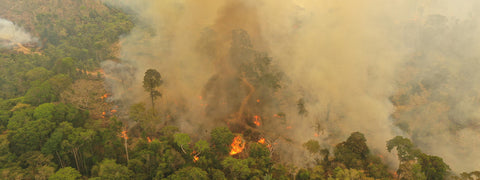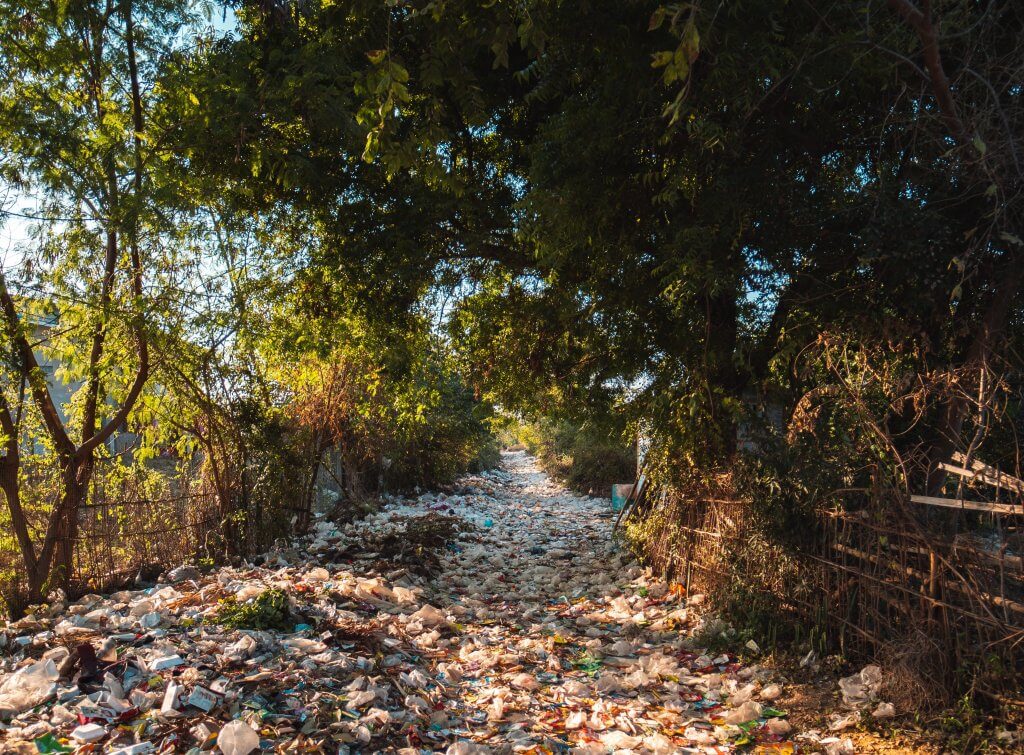We have heard a lot about deforestation , and without a doubt it is a threat that we cannot stop talking about and that demands structural solutions and our prompt action. As a general rule, deforestation is pointed out as one of the worst actions on the health of a forest , mainly due to the fact of losing the entire vegetation cover , that is, trees and plants of a specific space classified as forest.

However, degradation, which can become a more aggressive action , is a slow and sustained process over time, which is more difficult to demonstrate. Over time, the forest gradually loses its ecological health, to a point where the area is irreparably affected , making life unsustainable.
But what is degradation and what causes it? 
To understand it more clearly, we can make a comparison with deforestation. In a few words, deforestation consists of the felling of trees in an area classified as forest.
Also read our article on deforestation in Colombia so that you know a little better about its causes and consequences.
On the other hand, degradation is a state that occurs as a consequence of actions such as deforestation or fragmentation , it is basically a process of reducing the quality of forests that negatively affects its characteristics. And unlike deforestation, it occurs while the forest cover is maintained and results in the loss of forest functions , causing effects that can become irreversible.
In this case, it is considered that the forests lose their capacity to provide ecosystem services (such as their carbon storage capacity and oxygen production) and in most cases they suffer changes in the composition of the species, thus generating affectations at an ecological level. . That is, the forest as a land cover exists, but it does not function properly and its health declines to the point of not being able to support wildlife or offer more services to people.
There are different causes for which forest degradation can occur . We can find natural causes in which disturbances such as hurricanes, volcanic explosions, strong winds, among others, affect the functions of the forest and its biodiversity.

On the other hand, we find anthropic causes that directly or indirectly affect this process. Among them are: the fragmentation of forests, the exploitation of economic natural resources such as mining, livestock and agriculture, the propagation and introduction of invasive species, among others.
Is degradation really a threat?
For ecosystems, yes, for us as humanity... also, because with environmental degradation we lose hundreds of ecosystem resources as well as species of fauna and flora in an almost imperceptible way, which does not allow us to take timely action against this phenomenon.
Likewise, in addition to affecting the species of fauna and flora, in recent years it has been discovered that more biodiversity, ecosystem relations and hectares of forest are lost due to degradation than even due to deforestation itself. The SMByC affirms that, in the Colombian Amazon, in the period between 2012 and 2015, more hectares of forest were lost due to degradation than to deforestation, approximately 226,650 ha more. In this same study, the three most relevant factors that force forest degradation are: (1) selective logging (2) the collection of firewood and (3) forest fires. Thus , deforestation is, in most cases, the main precursor of degradation.
1. Forest and Carbon monitoring system.
What is the real problem?
Beyond the loss of the forest and its qualities, the real problem is the lack of action to prevent these degradation processes. We can commonly identify degradation due to the disappearance of certain species and the loss of biodiversity in a territory, but when we realize that a species has few specimens in an area or that it is even no longer present, it could already be too much. late to repair the damage.
We give you an example: think of the different animals that you used to see outside your window, think of insects or birds, now, if you are lucky enough to live in a space surrounded by nature and forests, also think of the great variety of species that you found when you were a child. Now maybe it's not like that anymore, maybe now you only see a bird once in a while, or some insect in a single season.
Species that you used to see frequently, now we only see them occasionally, this may be the cause of environmental degradation, either because a new species was introduced without taking into account the equilibrium conditions of the ecosystem and disturbed the most vulnerable species, due to the climate change that affected the resources that fed and sheltered certain animals, or by different natural or anthropogenic actions that affect ecosystems.

The problem is even more serious when the degradation process is clearly identified, either due to the absence of a species or a decrease in biodiversity. At that moment it is already too late to take minor corrective actions , you will need enormous actions that imply resources that in many cases are not easy to obtain, nor immediately and that would be necessary to recover a space that is slowly dying.
That's where the real problem lies, in a nutshell: by the time we identify the problem, it's too late to fix it.
When we identify deforestation, we see empty space, without trees, the damage has already been done. But in most cases, it can be regenerated and thus begin a process of seeding and restoration. It takes time, but it can be recovered.
But if it is a species that is disappearing and there is no possibility of taking immediate action for its protection, it is most likely that this species will become extinct and where can a species that no longer exists be recovered? Not only do you lose the species, the natural balance of the forest is also affected, thus degrading the entire ecosystem.
We live in the immediacy and the processes that are slower become imperceptible to us and, until they are large enough to become evident before our eyes, we do not see the need to take action.
Our eyes have been limited to being placed where there are deserted patches, where we do not find trees and we take for granted that a land is healthy just because it is green, but nature requires a sharper eye on our part, with more observation. and beware.
There are several questions that we can ask ourselves, if deforestation is a relevant cause of environmental degradation, what is happening at this moment with the world's forests in the face of high deforestation figures? What are we losing without realizing it? How can we really measure degradation if it is a process that shows the most drastic effects in months or perhaps years? We may not have all the answers, but by looking more closely at nature, understanding the processes as a mechanism related to each other and not as isolated events, it will allow us to act in such a way that we can understand that the decisions made today will have a impact on the ecosystems that we will have on our planet tomorrow.




Comments
Visite la página por que tenía que hacer una investigación sobre este tema, pero me inunda la tristeza y decepción al saber lo que pasa a nivel mundial y nuestra falta de empatía como sociedad hacia los seres vivos. Es cruel porque a pesar de que las soluciones a este problema abundan, nadie decide tomar acción o hacer lo posible por pararlo aunque las consecuencias sean irreversibles. Me gusto el artículo porque esta muy completo. Espero que puedan salvar el amazonas
No es ajeno a mi, lo que en la actualidad está ocurriendo con los animales, especialmente las aves, en Venezuela esa consecuencia climática y descuidos ante lo que a la vista está, deben hacernos reflexionar y ante dicha alerta, tenemos que ecoactivarnos!!!
Quisiera tener más conocimiento de lo que pasa en nuestro planeta